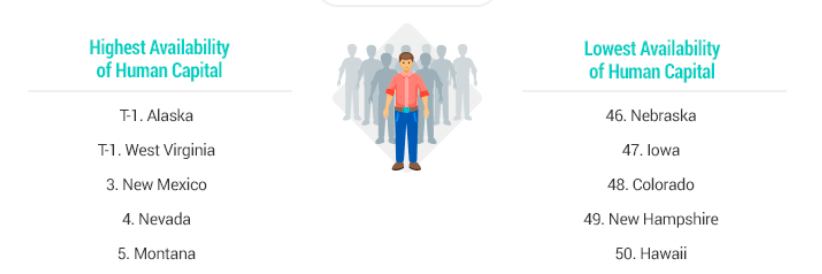A new analysis by WalletHub ranks New Hampshire 49th on the list of “Best States to Start A New Business.” But the reason for the bad ranking is actually good news for New Hampshire.
WalletHub’s analysis compared the 50 states across three key dimensions: 1) Business Environment, 2) Access to Resources and 3) Business Costs, using available public data. And in one area, New Hampshire’s score was absolutely awful: Availability of human capital. Also known as “Not enough available workers.”
“One of the most significant metrics that contributed to New Hampshire’s low ranking is the availability of human capital, where the state ranked second to last,” WalletHub financial analyst Jill Gonzalez told NHJournal.com. “There simply aren’t enough potential workers compared to the available work.”
In other words, New Hampshire’s unemployment rate (2.7 percent) is too low.
“Their analysis is fundamentally right,” David Juvet, senior vice president for public policy at the New Hampshire Business and Industry Association, told NHJournal.com. “We have a shortage of available workforce. and it’s a constant topic of conversation among employers.” But, Juvet adds, its effect is mostly felt among larger employers. “New Hampshire is still a great place for entrepreneurs looking to start a small business.”
Another good news/bad news data point from the WalletHub rankings is “Low spending on incentives,” also known as “tax dollar subsidies to businesses.” New Hampshire ranks 48th.
Gov. Chris Sununu’s Commissioner of Business and Economic Affairs Taylor Caswell points out that “these rankings give serious weight to government incentives, which New Hampshire doesn’t have.” He also pushed back on the idea that New Hampshire isn’t new-business friendly.
“Wallethub has ranked New Hampshire the fifth best state for jobs and number one for most job opportunities. We have the second-lowest unemployment rate in the nation, the second-fastest growth in personal income, the fastest growing New England economy, and unquestionably the best lifestyle asset combinations you will find anywhere,” Caswell told NHJournal.
“As long as you can take the winter,” he adds.
Still, the WalletHub report highlights a few areas of concern for long-term Granite State growth. They rank New Hampshire in the top 10 for highest costs of doing business. Part of this is relatively high labor costs due to tight labor market, but it also includes the state’s corporate taxes.
“Corporate taxes in New Hampshire are on the high side,” Duvet concedes. “They’ve gone down a bit in the past four years, but they’re still relatively high. At the same time, New Hampshire is New Hampshire. No sales taxes, no individual income taxes. This report doesn’t include those facts.”
Caswell agrees. Even the “bad” news is good news about the Granite State economy.
“We are very confident in our pro-growth, low-tax business environment, highly qualified workforce, and our academic institutions working with us to creatively meet the needs of our employer community.”
By the way, the worst state on WalletHub’s list of places to start a new business is Hawaii–which is currently struggling with a molten lava problem. New Hampshire doesn’t have to worry about that.


